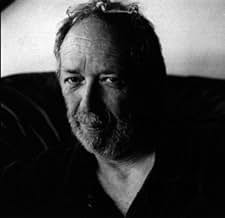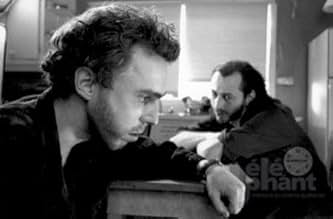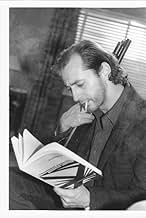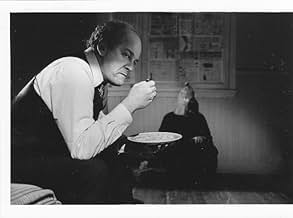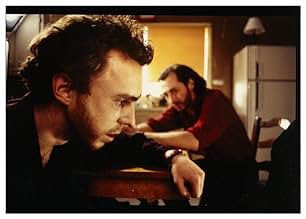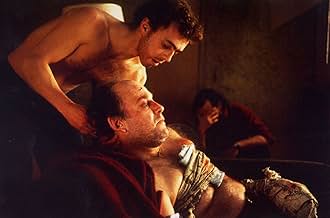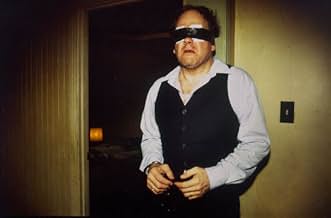Aggiungi una trama nella tua linguaA dramatization of the infamous Canadian terrorist abduction & murder of a government minister by a cell of The Quebec Liberation Front.A dramatization of the infamous Canadian terrorist abduction & murder of a government minister by a cell of The Quebec Liberation Front.A dramatization of the infamous Canadian terrorist abduction & murder of a government minister by a cell of The Quebec Liberation Front.
- Regia
- Sceneggiatura
- Star
Hugolin Chevrette-Landesque
- Neveu
- (as Hugo C. Landesque)
Recensioni in evidenza
Octobre - I have vivid memories of this sad time. I hoped this would be a film with a message for history. I didn't see it.
The idea that characters in this film tried to break out of their role in some human fashion is a mystery to me. The results of real-life October 1970 was not as complex as this film claims: The FLQ kidnapped and murdered a politician. That is not human - it is inhuman.
Another idea in this film is that the terrorists were simply working class people who got fed up with oppression and tried to wake up a nation. Once again the truth I remember in 1970 wasn't that complex. By kidnapping and murdering they became the oppressors they hated. Kafka was right - the rebel who kills the oppressor eventually becomes the oppressor.
Saddest of all for me is the film's implicit message that the FLQ terrorists were somehow faced with a dichotomy: to remain oppressed or to kill their kidnap victim for recognition.
How different is that from Islamic terrorists flying planes into buildings and others who think that they too are oppressed and unrecognized? I hope someone will someday make another film about this sad chapter in Quebec/Canadian history. And I hope that film will portray a vivid lesson that I learned living through that awful time: Murder and violence is an affront to humanity and will never build a civil or livable country! THAT is the only lasting message I remember from the October Crisis.
The idea that characters in this film tried to break out of their role in some human fashion is a mystery to me. The results of real-life October 1970 was not as complex as this film claims: The FLQ kidnapped and murdered a politician. That is not human - it is inhuman.
Another idea in this film is that the terrorists were simply working class people who got fed up with oppression and tried to wake up a nation. Once again the truth I remember in 1970 wasn't that complex. By kidnapping and murdering they became the oppressors they hated. Kafka was right - the rebel who kills the oppressor eventually becomes the oppressor.
Saddest of all for me is the film's implicit message that the FLQ terrorists were somehow faced with a dichotomy: to remain oppressed or to kill their kidnap victim for recognition.
How different is that from Islamic terrorists flying planes into buildings and others who think that they too are oppressed and unrecognized? I hope someone will someday make another film about this sad chapter in Quebec/Canadian history. And I hope that film will portray a vivid lesson that I learned living through that awful time: Murder and violence is an affront to humanity and will never build a civil or livable country! THAT is the only lasting message I remember from the October Crisis.
8N.L.
I saw this film shortly after it was released as part of a "sneak peak" series in Philadelphia. Not a single member (including me) of the otherwise well-read and educated audience knew anything about the historical events depicted in the film. This was embarrassing to say the least! In the discussion afterward, it was obvious that the audience universally appreciated the film, but it was also apparent that it would be a hard sell to U.S. ticket-buyers. So it became no surprise that it was not picked up for U.S. distribution. Because of woeful ignorance of most-things-Canadian that exists south of the border - and god forbid! subtitles - OCTOBRE vanished from our radar in the U.S.
If I had to use only one word to describe this movie, I'd say "strong". This movie is intense, thought-provoking and at the same time it is very smart.
I think it's pathetic that people said it was either white or black just because it was one of Falardeau's work (and that he's doing "propaganda" for the separatists). That is like saying soveregnists are too dumb to understand what they are fighting for, but the true stupid ones are those who didn't see the shades of grey in this movie. This film was not intended to show "bad guys" and "good guys", it was a movie about five men living hell in a small house for an entire week. Quebecers know their story, so the movie does not tell all the events that happened in Quebec during that time, it tells about something nobody is sure about, because what happened in this little house is only known by the five guys that were there. The movie is based on a book written by one of the guy, 12 years later, but Falardeau also read -many- documents about the events to be sure he was sticking to the facts when it came to the political/historical elements [read his book "La liberté n'est pas une marque de yogourt", for more info].
The "felquistes" have a heart in this movie, but some people think this is just to make us believe they were the "good guys". I believe thinking that is idiotic, because if the felquistes are shown as being nice, it doesn't mean the movie says they did not make a mistake. And a big one. See, that's what I meant about the shades of grey. Also, for younger Quebecers or people outside Quebec, a whole dimension of the movie --and of the felquist act-- is not understood, and that is when they [the felquists] say that they worked for English bosses that did anything they wanted to them. People tend to think the guy that says that in the movie is only talking about HIS situation, but he's talking about the general situation of Quebecers at that time: slaves to the English, "inferior" people that could not be given respectable roles in companies.
The dialogues are very interesting and the actors deliver an incredible performance. The silences toward the end of the film are heavy and highly dramatic... A true must-see for people interested in this part of Quebec's history, but you must know the political/historical/social setting to understand.
I think it's pathetic that people said it was either white or black just because it was one of Falardeau's work (and that he's doing "propaganda" for the separatists). That is like saying soveregnists are too dumb to understand what they are fighting for, but the true stupid ones are those who didn't see the shades of grey in this movie. This film was not intended to show "bad guys" and "good guys", it was a movie about five men living hell in a small house for an entire week. Quebecers know their story, so the movie does not tell all the events that happened in Quebec during that time, it tells about something nobody is sure about, because what happened in this little house is only known by the five guys that were there. The movie is based on a book written by one of the guy, 12 years later, but Falardeau also read -many- documents about the events to be sure he was sticking to the facts when it came to the political/historical elements [read his book "La liberté n'est pas une marque de yogourt", for more info].
The "felquistes" have a heart in this movie, but some people think this is just to make us believe they were the "good guys". I believe thinking that is idiotic, because if the felquistes are shown as being nice, it doesn't mean the movie says they did not make a mistake. And a big one. See, that's what I meant about the shades of grey. Also, for younger Quebecers or people outside Quebec, a whole dimension of the movie --and of the felquist act-- is not understood, and that is when they [the felquists] say that they worked for English bosses that did anything they wanted to them. People tend to think the guy that says that in the movie is only talking about HIS situation, but he's talking about the general situation of Quebecers at that time: slaves to the English, "inferior" people that could not be given respectable roles in companies.
The dialogues are very interesting and the actors deliver an incredible performance. The silences toward the end of the film are heavy and highly dramatic... A true must-see for people interested in this part of Quebec's history, but you must know the political/historical/social setting to understand.
In regards to previous comments, a few things need to be said. First, this movie is not a documentary and it doesn't have the pretension to be one. So I think you need to keep this in mind, and not expect to hear experts come to the camera and give «neutral» and «objective» clarification.
Second, the movie is based on a book written by one of the felquiste. So it would be incorrect to jump to the other extreme and say that the story is «fictionalized». The book, as well as the movie, is written in plain honesty, many years after the events that took place in 1970.
Keeping in mind that the movie depicts the events as seen through the eyes of one of the perpertrators, the movie is extremely effective in showing how Ideals can grasp people, how revolutions (often failed) occur, what it means to believe in something with all your heart. It also shows, and you must be blind not to see this, how events like these might as well take a proportion that was not intended, and that playing with the lives of individuals is not as easy as it might seem in the first place.
Octobre shows the real meaning of politics, of a political event, of a revolution. It shows that political events are never totally black or white.
You might say that because Falardeau is a separatist he doesn't give a neutral or objective point of view, and thus, the movie is biased. I'll be ready to accept this critique when somebody shows me a way to depict such an event in a neutral and objective way. A lot of people won't be able to appreciate Octobre for two possible reasons : a) they lack the necessary background to understand the story, or b) they view the movie as another absurd propaganda from separatists.
Other than that, Falardeau renders very well the tension that builds inside the small house where five people are stuck, waiting for the government to negotiate. It is a very emotional movie ; I saw the movie in Montréal when it came out. There weren't many people in the movie theatre. When the movie ended, I stood up to leave and noticed two older people, a man and a woman. Both we're still looking at the blank screen, silent. I thought that they were probably involved in the FLQ, that they were probably arrested also. Watching this movie must have been very difficult for them, at least this is what their eyes told me.
Second, the movie is based on a book written by one of the felquiste. So it would be incorrect to jump to the other extreme and say that the story is «fictionalized». The book, as well as the movie, is written in plain honesty, many years after the events that took place in 1970.
Keeping in mind that the movie depicts the events as seen through the eyes of one of the perpertrators, the movie is extremely effective in showing how Ideals can grasp people, how revolutions (often failed) occur, what it means to believe in something with all your heart. It also shows, and you must be blind not to see this, how events like these might as well take a proportion that was not intended, and that playing with the lives of individuals is not as easy as it might seem in the first place.
Octobre shows the real meaning of politics, of a political event, of a revolution. It shows that political events are never totally black or white.
You might say that because Falardeau is a separatist he doesn't give a neutral or objective point of view, and thus, the movie is biased. I'll be ready to accept this critique when somebody shows me a way to depict such an event in a neutral and objective way. A lot of people won't be able to appreciate Octobre for two possible reasons : a) they lack the necessary background to understand the story, or b) they view the movie as another absurd propaganda from separatists.
Other than that, Falardeau renders very well the tension that builds inside the small house where five people are stuck, waiting for the government to negotiate. It is a very emotional movie ; I saw the movie in Montréal when it came out. There weren't many people in the movie theatre. When the movie ended, I stood up to leave and noticed two older people, a man and a woman. Both we're still looking at the blank screen, silent. I thought that they were probably involved in the FLQ, that they were probably arrested also. Watching this movie must have been very difficult for them, at least this is what their eyes told me.
Again, Falardeau has put his camera where it hurts, where a camera should be ! A lot where fearing a radical, simplistic view of the events of October 1970, but were surprised to witness that the director's take on the FLQ's actions were concentrated mostly on the human aspect. These men were not brainwashed activists or militarily trained supermen, they were Quebec workers, french speaking working class citizens who got fed up with oppression and decided to wake up a nation. But by doing so, one soon realizes that he has to be willing to give up everything for the cause. These guys were not super heroes, they were not mindless protesters; they doubted, they feared, they hoped, they laughed, they cried, they hurt each other, they despaired...they were and are human beings. Real human beings. And that's what interested Falardeau. Ordinary people taking extraordinary measures to shake a system that doesn't want to listen to them. But they found themselves in a dead end once the government decide to send in the army instead of negotiating. If they would have let the hostage go, they're whole operation would have seemed as a farce and the demands of Quebec would once again not be taken seriously. But as they say in the film, they were not murderers. They were faced with a dilemma: go all the way or be forever sheep in a country that does not even recognize the existence of their nation. You can feel all the pressure of that dilemma in "Octobre". And to me, that is the main reason for the film's being. It is not simplistic. It does not evacuate the moral issues of the actions taken by the protagonist. It shows the other side of a revolution, the human difficulties that go with it. And that is no minor task. For once, in Quebec, we were told a story from a non-institutional point of view. And only this, to start with, makes "Octobre" essential viewing.
Lo sapevi?
- QuizPierre Falardeau: The homeless man up the stairs in the second subway station scene.
- ConnessioniEdited into Black October (2000)
I più visti
Accedi per valutare e creare un elenco di titoli salvati per ottenere consigli personalizzati
Dettagli
- Data di uscita
- Paese di origine
- Sito ufficiale
- Lingue
- Celebre anche come
- Outubro Violento
- Luoghi delle riprese
- Aziende produttrici
- Vedi altri crediti dell’azienda su IMDbPro
Botteghino
- Lordo Stati Uniti e Canada
- 349.633 USD
Contribuisci a questa pagina
Suggerisci una modifica o aggiungi i contenuti mancanti

